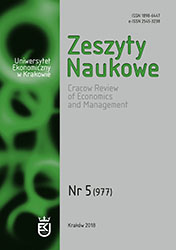Transforming Ukraine from Grainbasket to Brainbasket: The Role of the Diaspora
DOI:
https://doi.org/10.15678/ZNUEK.2018.0977.0513Słowa kluczowe:
diaspora, migracja, Ukraina, technologia, rozwój gospodarczyAbstrakt
Tytuł artykułu: Rola diaspory w transformacji gospodarki Ukrainy z surowcowej w przemysłową
Celem artykułu jest określenie roli diaspory w rozwoju przemysłu technologicznego na Ukrainie. Dokonany przegląd literatury pozwolił na lepsze zrozumienie terminu „diaspora” oraz wskazanie różnic pomiędzy tym pojęciem a pojęciem migracji. Podano przykłady państw, w których rozwoju gospodarczym diaspora odegrała kluczową rolę, co potwierdziło zasadność analizy tego zjawiska na Ukrainie.
W celu opisania działań diaspory w sektorze technologicznym na Ukrainie oraz określenia ich motywów przeprowadzone zostały badania empiryczne w formie pogłębionego wywiadu z kluczowym informatorem. Wyniki badań wskazują na to, że wkład diaspory jest obecny w wielu dziedzinach rozwoju gospodarczego Ukrainy, w tym w sektorze technologicznym. Motyw podejmowania przedsięwzięć, który odróżnia diasporę od przedsiębiorców spoza Ukrainy, to poczucie odpowiedzialności za dobrobyt swojego kraju pochodzenia.
Downloads
Bibliografia
Agunias D. R., Newland K. (2012), Developing a Road Map for Engaging Diasporas in Development, IOM, Geneva, https://publications.iom.int/system/files/pdf/diaspora_handbook_en_for_web_28may2013.pdf (accessed: 21.12.2017).
Anthias F. (2007), Ethnic Ties: Social Capital and the Question of Mobilisability, “The Sociological Review”, vol. 55, no. 4, https://doi.org/10.1111/j.1467-954x.2007.00752.x.
Bowles S., Gintis H. (2004), Persistent Parochialism: Trust and Exclusion in Ethnic Networks, “Journal of Economic Behavior & Organization”, vol. 55, no. 1, https://doi.org/10.1016/j.jebo.2003.06.005, https://doi.org/10.1016/j.jebo.2003.06.005.
Clifford J. (1994), Further Inflections: Toward Ethnographies of the Future, “Cultural Anthropology”, vol. 1, no. 3, http://wayneandwax.com/pdfs/clifford_diasporas.pdf (accessed: 21.12.2017).
Constant A. F., Zimmermann K. F. (2016), Diaspora Economics: New Perspectives, “International Journal of Manpower”, vol. 37, no. 7, https://doi.org/10.1108/ IJM-07-2016-0151.
Damm A. P. (2009), Ethnic Enclaves and Immigrant Labor Market Outcomes: Quasi-experimental Evidence, “Journal of Labor Economics”, vol. 27, no. 2, https://doi.org/10.1086/599336.
Dhanani Q., Lee M. (2013), Diaspora Investing – The Business and Investment Interests of the Caribbean Diaspora, World Bank, Washington, DC, https://openknowledge.worldbank.org/handle/10986/17610 (accessed: 21.12.2017).
Diaspora Networks and the International Migration of Skills: How Countries Can Draw on Their Talent Abroad (2006), Y. Kuznetsov (ed.), World Bank Institute, World Bank, Washington, DC, https://openknowledge.worldbank.org/handle/10986/7008 (accessed: 21.12.2017).
Dutia S. G. (2012), Diaspora Networks. A New Impetus to Drive Entrepreneurship, “Innovations. Technology, Governance, Globalization”, vol. 7, no. 1, https://doi.org/10.1162/inov_a_00116.
Edwards R., Holland J. (2013), What Is Qualitative Interviewing? (in:) G. Crow (ed.), “What Is?” Research Methods Series, University of Edinburgh, http://eprints.ncrm.ac.uk/3276/1/complete_proofs.pdf (accessed: 21.12.2017).
Elo M. (2014), Diaspora Networks in International Business and Transnational Entrepreueurship – A Literature Review, “Zentra Working Paper Series in Transnational Studies”, no. 40.
Fontenay C. de, Carmel E. (2002), Israel’s Silicon Wadi: The Forces behind Cluster Formation (in:) T. Bresnahan, A. Gambardella, A. Saxenian (eds), Silicon Valley and Its Imitators, http://www.ebusinessforum.gr/old/content/downloads/Israel.pdf (accessed: 21.12.2017).
Foresight of the Ukrainian Economy: Mid-term (2015–2020) and Long-term (2020–2030) Time Horizons (2017), International Council for Science (ICSU), Committee for the System Analysis of the Presidium of the NAS of Ukraine, National Technical University of Ukraine “Kyiv Polytechnic Institute”, Institute for Applied System Analysis of the NAS of Ukraine and MES of Ukraine, World Data Center for Geoinformatics and Sustainable Development, 2nd ed., NTUU “KPI”, Publishing House, Kyiv, http://wdc.org.ua/en/node/182604 (accessed: 21.12.2017).
Harima A. (2014), Network Dynamics of Descending Diaspora Entrepreneurship: Multiple Case Studies with Japanese Entrepreneurs in Emerging Economies, “Journal of Entrepreneurship, Management and Innovation”, vol. 10, no. 1, https://doi.org/10.7341/20141043.
Harima A., Vemuri S. (2015), Diaspora Business Model Innovation, “Journal of Entrepreneurship Management and Innovation”, vol. 11, no. 1, https://doi.org/10.7341/20151113.
Homans G. (1961), Social Behavior: Its Elementary Forms, Harcourt Brace, New York.
Kloosterman R., Leun J. van der, Rath J. (1999), Mixed Embeddedness. (In)formal Economic Activities and Immigrant Business in the Netherlands, “International Journal of Urban and Regional Research”, vol. 23, no. 2, https://doi.org/10.1111/1468-2427.00194.
Lazarsfeld P. F., Merton R. K. (1954), Friendship as a Social Process (in:) M. Berger et al. (eds), Freedom and Control in Modern Society, Van Nostrand, Princeton.
Meyer J. B., Wattiaux J. P. (2006), Diaspora Knowledge Networks: Vanishing Doubts and Increasing Evidence, “International Journal on Multicultural Societies”, vol. 8, no. 1.
Migration as an Enabler of Development in Ukraine. A Study on the Nexus between Development and Migration – Related Flows to Ukraine (2016), International Organization for Migration, Kyiv, http://www.iom.org.ua/sites/default/files/iom_migration_as_an_enabler_of_development_in_ukraine.pdf (accessed: 18.10.2018).
Nielsen T. M., Riddle L. (2009), Investing in Peace: The Motivational Dynamics of Diaspora Investment in Post-conflict Economies, “The Journal of Business Ethics”, vol. 89, no. 4, https://doi.org/10.1007/s10551-010-0399-z.
Nikolova M., Roman M., Zimmermann K. F. (2016), Left behind but Doing Good? Civic Engagement in Two Post-socialist Countries, “Journal of Comparative Economics”, https://doi.org/10.1016/j.jce.2016.04.006.
Safran W. (1991), Diasporas in Modern Societies: Myths of Homeland and Return, “Diaspora: A Journal of Transnational Studies”, vol. 1, no. 1, https://doi.org/10.1353/dsp.1991.0004.
Thibaut J., Kelly H. (1959), The Social Psychology of Groups, Wiley, New York.
Tölölyan K. (1991), The Nation State and Its Others: In Lieu of a Preface, “Diaspora: A Journal of Transnational Studies”, vol. 1, no. 1, https://doi.org/10.1353/dsp.1991.0008.
Ukrainian Diaspora Investment Study (2016), The United States Agency for International Development (USAID), Washington, DC, https://pdf.usaid.gov/pdf_docs/PA00M5ZW.pdf (accessed: 18.10.2017).




